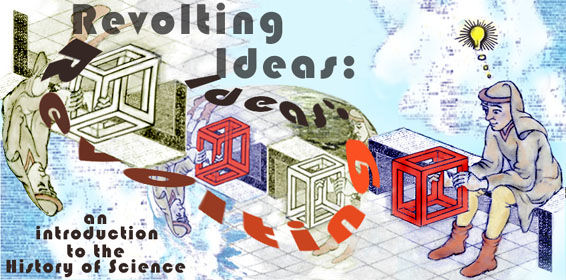

History 60
Department of History
University of California, Irvine
____________
I hope the information and ideas you find on these pages will both satisfy and further stimulate the curiosity that led you here. Instructor: Dr. Barbara J. Becker
Chapel Hill, April 2010 |
|
|
|
| Week 1. Likely Stories: The "Way of Truth" vs. the "Way
of Seeming"
Reading: Kuhn, chs. I and II; Week 1 Readings The word "science" derives from the Latin word scire, which means "to know." What do we know about the natural world? How do we come to know it? And, when--if ever--can we be confident that our "knowledge" of how the world works is something more than just another "likely story"? |
|
| 1. Thoughtspace and Workspace 2. Greeks and Romans |
|
| Week 2. Transmission Trouble: Preservation vs. Modification
Reading: Kuhn, chs. III and IV; Week 2 Readings In the long run, it's not always what we know that really matters. If our ideas are to have any lasting influence, we will need to find a reliable way to communicate them--without distortion--to others. Therein lies the challenge. |
|
| 3. Schools and Scholars 4. Preservation and Modification |
|
| Week 3. Humanism: Revolutionaries vs. Reactionaries
Reading: Galileo, Starry Messenger (in Drake); Kuhn, chs. V and VI; Week 3 Readings Authoritative texts occasionally contradicted what was observed in nature. How could the diligent scholar reconcile these differences and rescue ancient manuscripts from errors of interpretation and translation? |
|
| 5. Babies and Bathwater 6. Spheres and Harmonies |
|
| Week 4. Heavenly Reading: The Book of Nature vs. the Book
of Scripture
Reading: Galileo, Letter to the Grand Duchess Christina, and The Assayer (in Drake); Kuhn, ch. VII; Week 4 Readings A moving earth required a new physics. A new physics required new instruments, new techniques, and new rules for putting them to the test. Did it also need Galileo? |
|
| 7. Seeing and Believing 8. Argument and Agreement |
|
| Week 5. Putting Nature on the Rack: Private Science vs.
Public Science
Reading: Kuhn, ch. VIII; Week 5 Readings During the seventeenth century, there was a proliferation of scientific societies--communities of individuals, often working outside the traditional university context, who were attracted by the new experimental approach to natural philosophy. They didn't want to hear or read about Nature. Instead, they aimed to force it to give up its secrets by pulling it, jabbing it, and taking it apart. |
|
| 9. Experience and Experiment 10. Curiosities and the Curious |
|
| Week 6. Universal Reason: Aristotle vs. Newton
Reading: Kuhn, ch. IX; Week 6 Readings Newton believed that Reason is immutable and universal, that all have the capacity to exercise it, and that all natural phenomena are legitimate subjects of reasoned investigation. He introduced a new three-step method to guide his followers: analyse, synthesize, then generalize. |
|
| 11. Mathematics and Motion 12. Light and Enlightenment |
|
| Week 7. Natural Forces: Attraction vs. Repulsion
Reading: Shelley, Frankenstein; Kuhn, ch. X; Week 7 Readings When curious investigators put Newton's method to work, they encountered many new and interesting puzzles. Natural forces like electricity and magnetism, for example, act even when bodies are not in direct contact. What is the physical nature of such a power? How can their effects be analysed, measured and quantified? |
|
| 13. Attraction and Repulsion 14. Electricity and Magnetism |
|
| Week 8. Living Machines: Mechanism vs. Vitalism
Reading: Kuhn, ch. XI; Ruse, Prologue and chs. 1-3; Week 8 Readings In the early nineteenth century, the prevailing metaphor for natural phenomena began to change from machine to organism. What is it that distinguishes between living and non-living things? What animates living things? Where does this vital spirit reside? Has the earth developed in abrupt jumps and starts? Or has it been a slow and gradual metamorphosis? Are the forces of geological and biological change the same today as they were millennia ago? What clues do we have? What methods are legitimate to use in investigating these phenomena? |
|
| 15. Natural and Artificial 16. Stones and Bones | |
| Week 9. Natural selection: Adaptation vs. Extinction
Reading: Kuhn, ch. XII; Ruse, chs. 5 and 8-9; Week 9 Readings Some historians of science have stated that Darwin triggered a scientific revolution when he published On the Origin of Species. But Darwin was asking questions deemed appropriate for scientists to ask and answering them using methods that scientists of his day accepted as valid. Even Thomas Kuhn would have to agree that he was a true "normal" scientist working on "normal" puzzles using "normal" methods. And Darwin certainly was not the first to suggest that present day animals have evolved from earlier forms. So what is the "revolution" here? |
|
|
17. Struggle and Survival 18. The Fit and the Unfit |
|
| Week 10. New worldview: New vs. Improved
Reading: Kuhn, ch. XIII and Postscript; Week 10 Readings What are legitimate research questions for scientists on the cutting edge? What are legitimate investigative techniques? What role should scientists play in shaping and implementing public policy? |
|
|
19. Life and Death 20. Matter and Mystery |
|
|
|
|
|